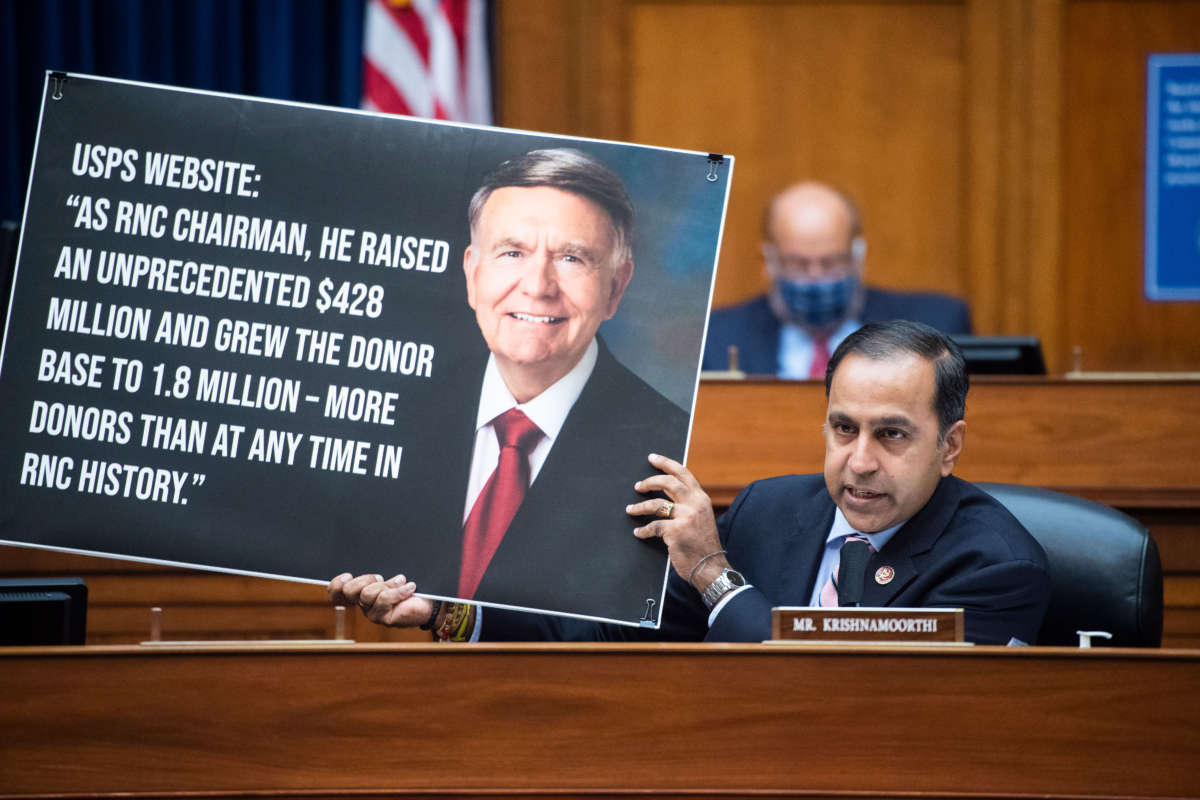The United States Postal Service (USPS) Board of Governors Chairman, Robert M. Duncan, is a director of the Mitch McConnell-allied Senate Leadership Fund Super PAC, as paperwork filed Monday confirmed. The ties between Duncan and McConnell deepen concerns about the integrity of what will likely be an election largely conducted with mail-in ballots, which has also been complicated by issues with a Republican-led gutting of the USPS.
Duncan’s ties to the $130 million Senate Leadership Fund is just one of the chairman’s ties to prominent Republicans. Moreover, nearly all of the people on the Trump-nominated USPS board of governors have ties to the Trump administration.
The Postal Services’ board of governors is tasked with overseeing the USPS and “directs the exercise of the powers of the Postal Service, directs and controls its expenditures, reviews its practices, conducts long-range planning, approves officer compensation and sets policies on all postal matters,” according to the USPS website.
Stay in the loop
Never miss the news and analysis you care about.
However, many have expressed concerns recently about the integrity of those leading the USPS as Postmaster General Louis DeJoy has made major cuts to service just months ahead of the presidential election. These cuts come after Trump’s continual attacks on the Postal Service and mail-in voting. Due to these cuts, service has been delayed, mail sorting machines have been shut down and staff hours have been cut. This has led to 20 states suing over the service overhauls, and DeJoy vowing to pause changes until after the election, though the dismantling of the mail sorting machines continued.
In his testimony to the House Oversight Committee last week, DeJoy claimed that the changes were not motivated by the election. And on Monday, the committee announced plans to subpoena DeJoy over documents it requested at the testimony but has yet to receive.
As postmaster general and a top GOP donor, DeJoy has faced the most public scrutiny over the USPS overhauls. His actions have led prominent senators like Bernie Sanders and Elizabeth Warren to call for the USPS board of governors to ”reverse changes to postal service operations that have been put in place by Postmaster General Louis DeJoy” in a letter dated August 17.
However, shortly after, revelations about DeJoy’s potential conflict of interest because of his large ownership stake in a USPS contractor, as also information about individuals on the Postal Service’s board of governors and their ties to Trump came to light, leading Senator Warren to pen another letter on the 24th to the board asking for disclosure of federal financial forms that could inform the public of any conflicts of interest.
A review by CNBC found that five out of six of the board members have financial ties to the Republican party and the Trump administration. CNBC found Duncan is listed as a director of a Republican Super PAC called American Crossroads that’s supporting Trump in this election; William Zollars appears to have made a deal with Treasury Secretary Steve Mnuchin for a $700 million loan for a company which Zollars serves as an executive; Donald Moak, before his confirmation on the board, was the co-founder of a company that hired Stefan Passatino for legal work before Passatino served in the Trump administration; Roman Martinez was a representative of the estate of a wealthy investment banker and Republican party donor. Both John Barger and Zollars’s companies received loans from the Paycheck Protection Program, which gave small business relief loans toward the beginning of the coronavirus pandemic. Many of the businesses that received loans had ties to the Trump administration.
These ties aren’t necessarily hidden. Duncan’s official biography on the USPS website says that “he raised an unprecedented $428 million and grew the donor base to 1.8 million — more donors than at any time in RNC history” and was the president and CEO of the American Coalition for Clean Coal Electricity, a nonprofit that represents the interests of the coal industry, an industry which Trump is bolstering. In addition, Duncan’s son, Robert M. Duncan Jr., was nominated by Trump in 2017 to be the U.S. Attorney for Kentucky.
Though these connections aren’t necessarily damning individually, together, they paint a picture of a web of questionable intents. As The New Yorker’s chief Washington correspondent, Jane Myer, tweeted: “Anyone thinking Trump’s assault on the postal service is a rogue move needs to understand that Mike Duncan, Trump’s Postal Service Chairman is McConnell’s guy.”
Press freedom is under attack
As Trump cracks down on political speech, independent media is increasingly necessary.
Truthout produces reporting you won’t see in the mainstream: journalism from the frontlines of global conflict, interviews with grassroots movement leaders, high-quality legal analysis and more.
Our work is possible thanks to reader support. Help Truthout catalyze change and social justice — make a tax-deductible monthly or one-time donation today.
